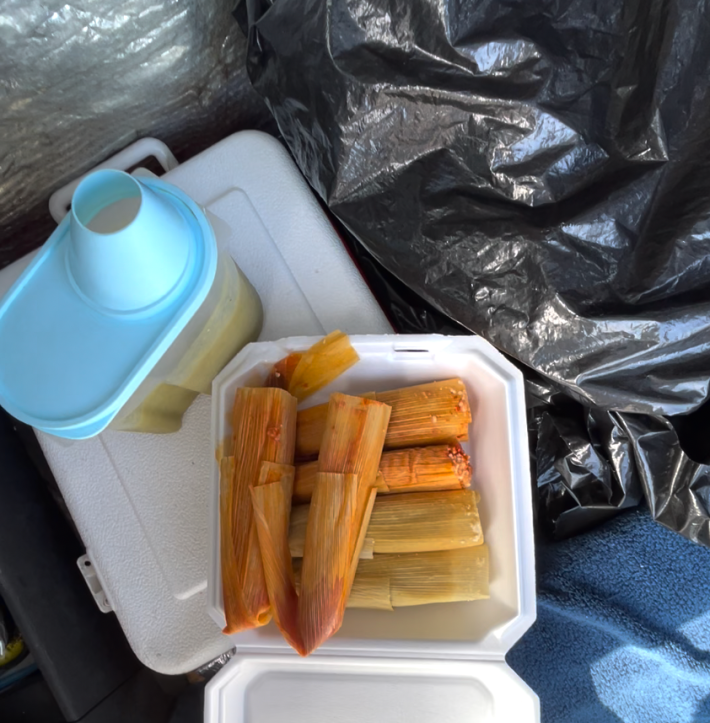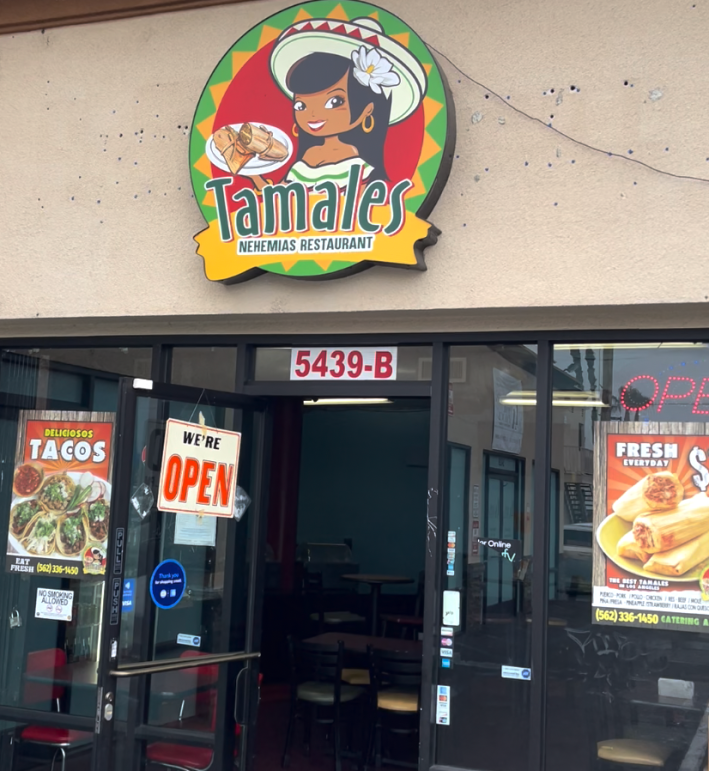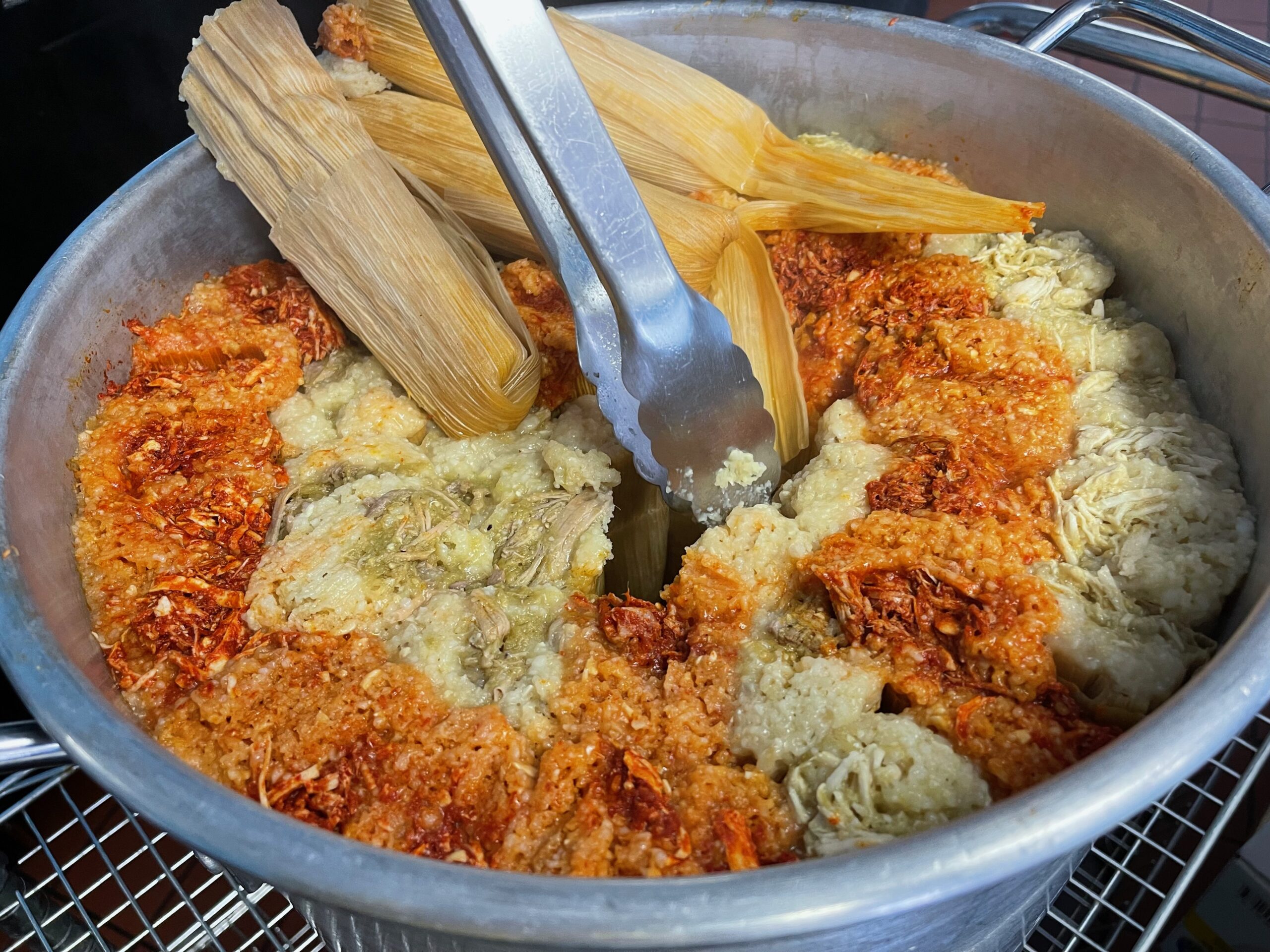Honest question: Do you know if your favorite local tamales are made from the painstaking, thousand-year-old nixtamal masa process? Or are they made from the much more convenient Maseca (instant masa flour)?
For some of us, this keen distinction is everything due to the absolutely different values in food politics they stand for. The former tends to produce rustic tamales that are tender-to-the-bite. The latter technique produces smoother tamales that are cakey, or as Long Beach tamalero Ramon Martinez says in Español, “the kinds of tamales you can’t eat on their own and need a drink to wash it down.”
Most tamales found in the streets of Los Angeles are made with Maseca, due to this “masa harina,” as it is called, being about ten times cheaper than nixtamal. It is also much faster to assemble and cook. All this makes Martinez’s tamales—made from the even harder-to-find masa quebrada (a coarser grind of masa), all the more honorable and special. The grind for broken masa leaves some of the nixtamalized field chunkier; imagine a savory cake made from grits.
Ramon is from Honduras, and his wife, Andrea Martinez, comes from Veracruz, Mexico. They have both been making tamales proudly from nixtamal-only (many other tamalerías also mix the two masas) to sell in the parking lot of The Home Depot on Cherry Avenue in Signal Hill since 2017.
Andrea’s tamales will stop you in your tracks.
The difference in texture, appearance, and flavor is immediately present as soon as you unwrap his slender Veracruz-style tamales. In Veracruz and other parts of Mexico, cooks season the masa with actual red chiles, which produce a tamal that is red in color all around—not in just the filling. Unlike other tamaleros, they are very generous with the shreds of pork, chicken, or cheese inside.

These differences in portion and flavor are all intentional because Ramon and Andrea know that their trusty clientele, mostly made up of day laborers and working-class tradesmen who frequent Home Depot, depend on the precious protein and filling properties of tamales to hold them over in their long work days.
When asked if he has ever been tempted to use Maseca or cut the nixtamal with a little Maseca to maximize profits, Ramon scoffs at the idea, saying, “No, no, no. Why? Making tamales this way with nixtamal is the original way and the other is an experiment. Besides, those tamales are always dry.”
They offer five different tamales, broken down by pork and chicken in either red or green salsa, as well as one made with cheese and jalapeño slices. All are exceptionally moist, thanks to a masterful use of lard that is more subtle in flavor. In the parking lot alone, Ramon sells 400 tamales a day, usually in a span of four hours max, but often, it only takes half that time.
One of the pettiest kinds of beef between street vendors and brick-and-mortar restaurants has been the “they’re stealing our customers” argument. It doesn’t matter that data has shown that the type of customer who will pay $2.25 for a tamal in a Home Depot parking lot is not the same customer who would prefer to sit down at a restaurant to enjoy a leisurely meal.
What makes Ramon even more of a tamal outlier is the brick-and-mortar restaurant that he has further up north on Cherry Boulevard. He won’t bring it up unless you ask, but he and his wife saved two years of worth of tamal profits to open up their own place, Nehemia’s Restaurant, where they cook the tamales and offer other Mexican homestyle dishes, like chiles rellenos served with handmade tortillas.
Ramon always keeps his framed business license within arm’s distance on the corner of his white minivan. He says that every couple of months, he will have a disgruntled passerby come up to him and tell him that he can’t be selling tamales in the parking lot.
“It’s people from all backgrounds, Latinos, too,” he says sadly. “They come up to me and call me racist things and think I cook this out of my home, so I always have my permit ready to show anyone who thinks I am not legit.”


Even though, legally, no one has the right to demand that permit from Ramon, he is traumatized from many bad experiences over the years. He shares that the last time it happened, one of his customers recorded a random person yelling racist things at him.
“My customers stand up for me, he says.”
Those same customers are usually waiting for him for breakfast as soon as Ramon shows up at 7:30 a.m. every day (except Sunday, when he only sells out of his restaurant).
One of the pettiest kinds of beef between street vendors and brick-and-mortar restaurants has been the “they’re stealing our customers” argument. It doesn’t matter that data has shown that the type of customer who will pay $2.25 for a tamal in a Home Depot parking lot is not the same customer who would prefer to sit down at a restaurant to enjoy a leisurely meal. “So many people who try to call me out are so surprised to learn that I also have a restaurant,” he notes.
Ramon, in all his duality as a street food vendor-meets-restaurant-owner, is a reminder that all street vendors are entrepreneurs and some, like Ramon, still honor the importance of the golden rule of street food: always bring the food directly to your original customers, no matter how big you get.
Ramon sets up in the parking lot at The Home Depot at 2450 Cherry Ave, Signal Hill, CA 90755, starting at 7:30 a.m. every day except Sunday (where he only sells out of his restaurant). He usually is done by 11 a.m. but sometimes will sell out much earlier. Each tamal is $2.25.
Nehemia’s Restaurant is located at 5439B Cherry Ave Long Beach, CA 90805.
The Home Depot - Closest transit lines: Long Beach Transit Lines 21, 22, 23, 102, and 104 - "Cherry/Willow."
Nehemiah's Restaurant - Closest transit lines: Long Beach Transit Lines 21 and 23 - "Cherry/Market."






